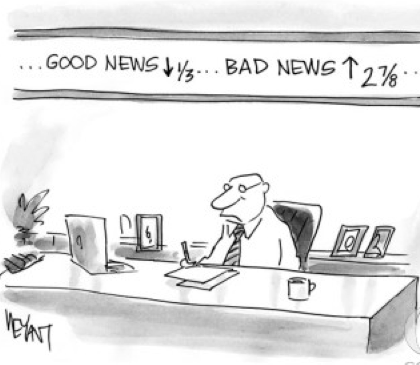
This. Elections 2016





1) The stock market is never obvious. It is designed to fool most of the people, most of the time.
2) Play the market only when all factors are in your favor. No person can play the market all the time and win.There are times when you should be completely out of the market, for emotional as well as economic reasons.
3) Do not use the words “Bullish” or “Bearish.” These words fix a firm market-direction in the mind for an extended period of time. Instead, use “Upward Trend” and “Downward Trend” when asked the direction you think the market is headed. Simply say: “The line of least resistance is either upward or downward at this time.”Remember, don’t fight the tape!
4) The game of speculation is the most uniformly fascinating game in the world. But it is not a game for the stupid, the mentally lazy, the person of inferior emotional balance, or the get-rich-quick adventurer. They will die poor.
5) The only thing to do when a person is wrong is to be right, by ceasing to be wrong. Cut your losses quickly, without hesitation. Don’t waste time. When a stock moves below a mental-stop, sell it immediately. (more…)

Why do some win in the market and some lose? Some thoughts on winning and losing:
Winning Trader’s Traits
Losing Trader’s Traits
 In trading, as in life in general, we all know that experience is the best teacher. However, failures in stock market trading bear more weight since you stand to lose thousands of dollars (or more) with each mistake that you make. So as to help you recognize red flags and prevent you from losing money further, here is a list of some common mistakes you might want to avoid.
In trading, as in life in general, we all know that experience is the best teacher. However, failures in stock market trading bear more weight since you stand to lose thousands of dollars (or more) with each mistake that you make. So as to help you recognize red flags and prevent you from losing money further, here is a list of some common mistakes you might want to avoid.
# 1: Lack of proper knowledge
Many people who come into stock trading with the notion that they can simply learn the ropes along the way may be fatally mistaken. This is because this kind of activity requires some degree of stock market know-how, as well as experience. First, you have to learn how to trade stocks, because this is the only that you can be familiar with terms, such as “stocks,” “shares,” “dividends,” “trends,” and so on. Without proper education, you might make decisions that could prove to be costly in the future. If you want to engage in trading, the first rule is for you to learn about the basics-read a book, enroll in a course, attend lectures by experts-anything that can help you understand what this is all about.
# 2: Acting on Impulse
In learning stock trading, you will realize that many emotions may come into play as you go through each and every transaction-impatience, greed, fear, and over confidence are some of these emotions. One of the most common mistakes people commit while trading is making decisions based on impulse. While it is true that you can feel a wide range of emotions as you evaluate the data in front of you, do remember that a cool, logical reasoning must prevail. Do whatever you can to always make decisions on a clear head.
# 3: Not having enough practice
As you engage in trading, the saying that “practice makes perfect” could not be truer. Again, if you want to learn how to trade stocks and are serious about engaging in trading, then you should also enhance your skills apart from just learning the basics. However, you could not afford the trial and error method using real money, because this is impractical and a waste of time. Fortunately, there are now some sophisticated tools that can help you practice through simulated trading and practice accounts. For a fee, companies can help you set up a practice account, through which you can execute “simulated trading.” What this does is it helps you learn how to trade stocks by honing your skills without the risk of losing actual money.
# 4: Having unrealistic expectations
Finally, another common mistake in trading is having unrealistic expectations. Sure, we may have all heard of those who got rich quick because of the stock market, but you cannot expect to earn millions without being able to make sound decisions based on fact. In the process of learning stock trading, you must be able to set a clear set of objectives, and not unrealistic expectations that could lead you to make rash (and costly) decisions.
In the future, try to avoid committing similar mistakes so that you can truly benefit from the time and effort you are trading in the stock market.
